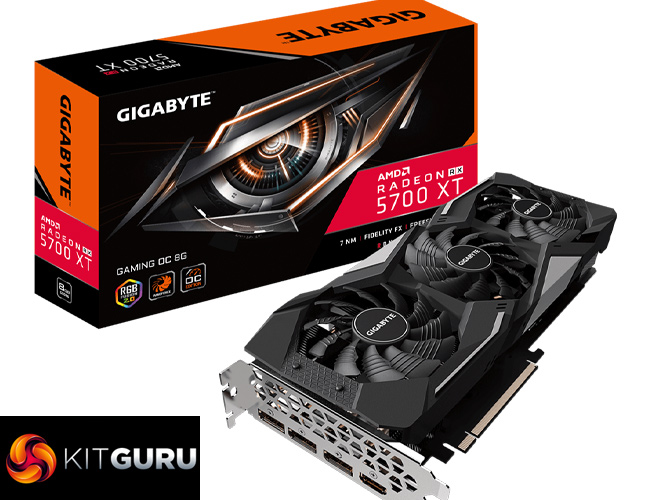Today we have pitted two graphics cards – both from Gigabyte – against each other in a head-to-head comparison. The cards in question are the Gigabyte RX 5700 XT Gaming OC and the Aorus RX 5700 XT. For those who don't know, Aorus is Gigabyte's premium sub-brand – at the time of writing, the Aorus 5700 XT costs £410, while the Gigabyte Gaming OC is £375.
So what do you get for the extra money? In my mind, there are two main advantages for the Aorus, and then a few other more minor points. The first point is out of of the box clock speed – the Aorus ran almost 115MHz faster than the Gaming OC, giving it a 4% performance advantage (on average) across the 11 games we tested today.
The second main point in favour of paying extra for the Aorus is its on-board dual-BIOS support. You can choose between either the OC BIOS with its high clocks and faster fans, or switch to the Silent BIOS and drop the fan speed considerably for a quieter gaming experience. This is a feature I value highly, both because it gives the card a bit more versatility, but also because a second BIOS is great for redundancy should you brick the first one.
We also saw marginally lower temperatures with the Aorus card (using its OC BIOS) when compared to the Gaming OC, but in my view this isn't enough to pick the Aorus over the Gaming OC – the edge temperature was only 1C lower for the Aorus, while the memory ran 4C cooler. In my view, it's not much of a win at all.
Personally speaking, I also prefer the design of the Aorus card. This is obviously going to be personal preference, and some of you simply may not care at all, but the Gaming OC is just a bit plain looking in my opinion, while the Aorus offers something a little extra. Contrasted against that, the Gaming OC is physically smaller so if you have a case which may not fit the Aorus 5700 XT, then that is also something to consider.
I was also surprised to see that both cards are using essentially the same PCB design. This works out as a positive for the Gaming OC as the Aorus does not have a beefed-up VRM in comparison which I have to admit, I was expecting to be the case. It's not necessarily a negative for the Aorus, but aside from on-board dual-BIOS there's nothing unique or different to the PCB of the Gaming OC.
With all that said, which card should you buy? Well, if you're just looking for a simple RX 5700 XT to install and forget about, the Gaming OC is £35 cheaper than the Aorus and still offers a factory overclocked core and very solid cooler. That'd be my recommendation for anyone who doesn't want to tinker with the BIOS or isn't interested in the extra features the Aorus can offer.
On the other hand, I prefer the design of the Aorus card, while it is also faster out of the box and has that dual-BIOS support which I value highly. For me, that is enough to pay an extra 10% for. Ultimately, both cards are solid choices and I wouldn't really say one was outright better than the other – it really comes down to what feature-set you are looking for and how much you are prepared to pay.
Discuss on our Facebook page HERE.
You can buy the Gigabyte RX 5700 XT Gaming OC for £374.99 from OCUK HERE.
Pros
- Solid cooler.
- Relatively compact.
- Good value at £375.
- Factory overclocked core.
Cons
- Subjectively speaking, it's plain looking.
- No dual-BIOS.
You can buy the Aorus RX 5700 XT for £409.99 from OCUK HERE.
Pros
- Striking aesthetic.
- Dual-BIOS.
- Heavily factory overclocked.
- 10% price premium over the Gaming OC is fair.
- Solid cooler.
Cons
- Relatively large.
- Would've expected a tweaked PCB design compared to the Gaming OC.
KitGuru says: If you have the money, the Aorus RX 5700 XT offers a few extra features and a different design which I think justify the increased cost. For £35 less, however, the Gaming OC is still a very solid option that doesn't do much wrong.
 KitGuru KitGuru.net – Tech News | Hardware News | Hardware Reviews | IOS | Mobile | Gaming | Graphics Cards
KitGuru KitGuru.net – Tech News | Hardware News | Hardware Reviews | IOS | Mobile | Gaming | Graphics Cards




